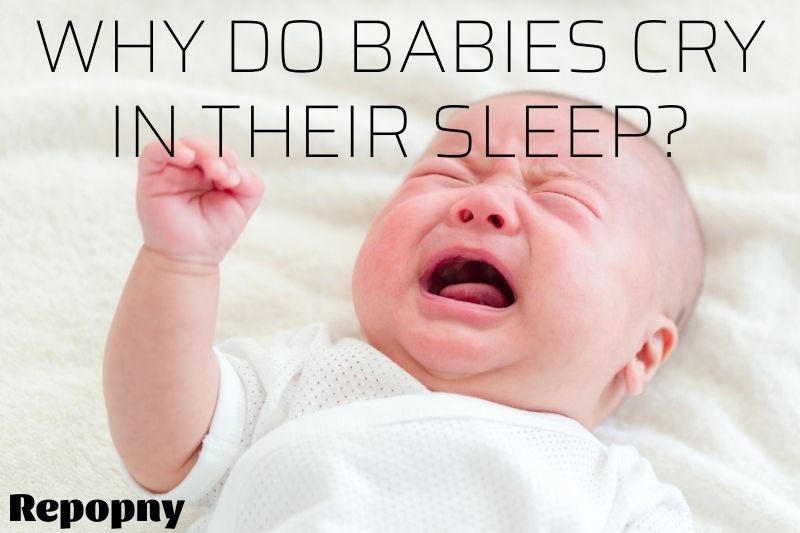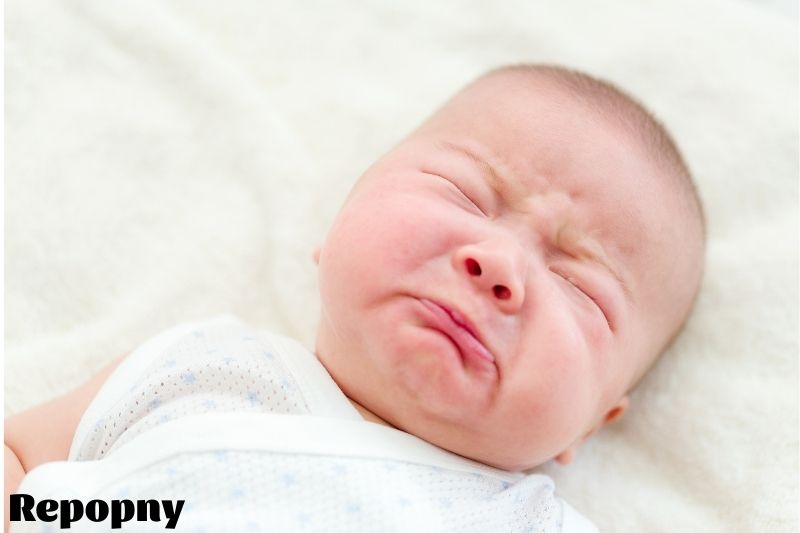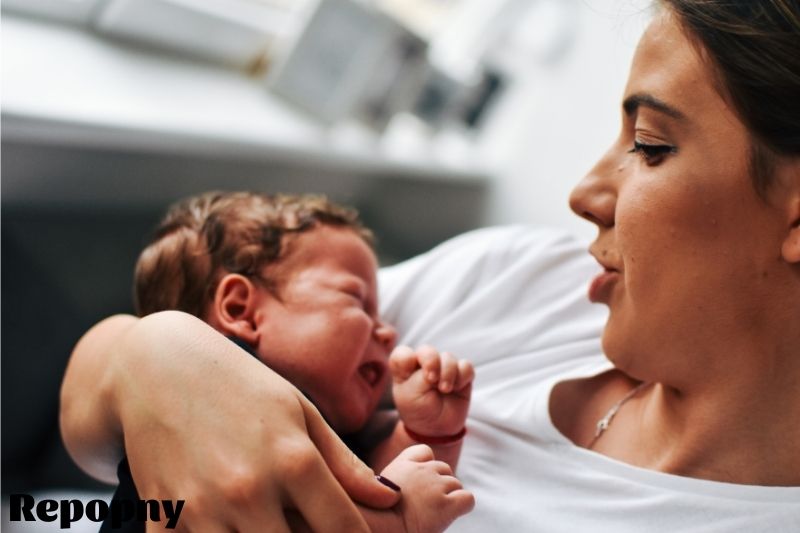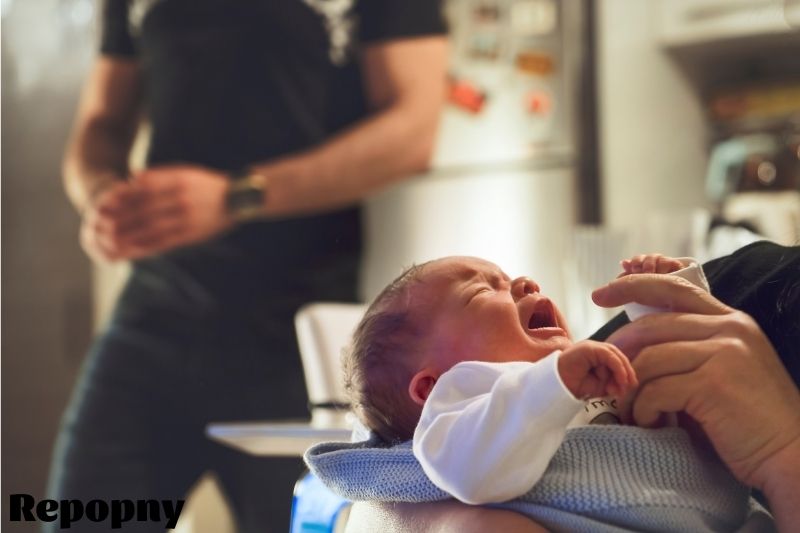- Repopny
There are a few reasons why babies cry in their sleep. They may be having a bad dream, or they may be experiencing some discomfort. It’s also possible that they’re simply missing their parents and are feeling lonely.
In this article, Repopny will find the answer to the question: why do babies cry in their sleep? And how to comfort your baby and let them know that you’re there for them.
Contents
What Causes Babies To Cry While Sleeping?
Although it is unusual for babies to cry while sleeping, it does occur. When some parents hear their infant wailing, they turn on the monitor only to find their baby’s eyes closed. Other parents may check on their child only to discover that the wailing has stopped and that their child is sound asleep.
You may be perplexed by this behavior and wonder whether something is wrong. Understanding why newborns scream in their sleep will assist you in determining what to look for and how to help your child.
Weeping as you switch from one sleep cycle to the next
Babies, like adults, sleep in cycles. Unlike adults, however, babies switch between sleep cycles quickly and spend more time in REM sleep than deep sleep.
You may observe your baby’s eyes moving a lot under their eyelids during this stage (this is where the term “rapid eye movement,” or REM, comes from). During REM sleep, babies can be seen moving their arms and legs, closing and opening their hands, twitching or jerking, and even wailing.
Many babies will experience a brief waking at the end of each cycle, which lasts 40 minutes. Babies may wail for a few minutes before returning to sleep, or they may not even wholly awaken during this brief wakeup.
Crying as a result of exhaustion
Babies can quickly become overtired if they don’t get enough sleep or are awake for longer than they can handle. Overtiredness causes fatigue-fighting chemicals to be released, making it more difficult for babies to fall and remain asleep.
It appears to be counter-intuitive, and it cannot be easy. The most typical causes of your infant weeping in their sleep are exhaustion and large tears soon before falling asleep.
Teething pain causes crying
When dental buds start to emerge, babies may be irritated – and they’ll let you know. Teething babies are fussier and will frequently whine throughout the day and night owing to the discomfort.
You may observe more frequent mild sobbing or whimpering while your kid is asleep if you feel they are working on a new tooth. Inquire with your child’s pediatrician about treatment options for teething pain.
When your baby is crying in their sleep, it’s good to wait and watch unless you’re concerned about their safety. When you react too hastily, you risk waking your child up completely or preventing them from falling back asleep on their own.
Crying during sleep is developmentally acceptable and does not always necessitate assistance. So, the next time your kid starts sobbing with their eyes closed, take a step back and wait to watch what happens. Your kid may astound you by ceasing to cry on their own!
If you are curious about when babies can sleep with a blanket, see our guide.
Is It Possible For Babies To Have Nightmares?
“What are they dreaming about?” we’ve pondered as we watch our newborns sleeping. Those beautiful smiles your kid gives in their sleep are involuntary and not in response to a dream (but we can all dream, right?).
Dreaming begins later in life, around the age of two. What’s the good news? Babies do not have nightmares, night terrors, or horrible dreams, and weeping in their sleep is most likely due to the causes above.
How Can You Calm A Crying Baby?
When a baby cries out momentarily in its sleep, it usually settles down on its own. Picking them up may wake them up, causing sleep disruption.
If the crying persists, try quietly speaking to the baby or gently massaging their back or stomach. This can help them transition to a different sleep stage and cease screaming.
Breastfed newborns who suckle while sleeping may find nursing comforting. Caregivers should consider if the infant will wake up from nursing and whether they are prepared to take the risk of waking the baby.
Observing the baby’s sleep habits might also be beneficial. Some babies cry quietly as they drift off to sleep or just before waking up. Caregivers can analyze the cause of weeping by identifying the baby’s regular sleep cycle.
When a baby is unwell or teething, they may cry in their sleeping, but the pain that causes crying usually wakes the baby up. Caregivers can consult a pediatrician for advice on alleviating the baby’s discomfort.
Although we don’t know when dreams begin, a caregiver who suspects their child is suffering might quiet them down by talking calmly or caressing their back. Nursing may provide comfort to babies who are still breastfed.
If a baby wakes up after a nightmare, console them and put them back to sleep with a calming sleep ritual. Older newborns and toddlers may require reassurance that the experience was merely a nightmare.
When Should You Consult A Doctor?
- Talk to your doctor about nighttime crying or other problems.
- A child who is in pain cries out
- A child’s sleeping habits can suddenly change
- This problem can last several nights and cause sleep problems in children. It interferes with caregivers’ ability to function.
- Sleep disturbances can be caused by feeding problems, such as poor latching, insufficient breast milk or concerns about formula sensitivity.
What Are The Typical Sleep Patterns For People Of Various Ages?
In newborns and early children, there is no single natural schedule. Over the first three years of life, sleep habits very rapidly, with a lot of diversity between children. The amount of time you spend crying in bed will fluctuate over time.
Babies have shorter sleep cycles and spend more time in light sleep than adults, making them more likely to cry, grunt, or produce other noises while sleeping.
Cultural and family standards can also influence sleep expectations. Caregivers can adopt sleep practices that work for them, their culture, and their baby’s needs and personality with the help of a healthcare expert.
The average sleep patterns for babies of various ages are discussed in this section. There are many variances, so if a baby’s sleep pattern differs from the ones listed below, it’s usually nothing to worry about.
Newborns (ages 0–1)
In the first month, sleep is inconsistent, with brief waking intervals followed by naps and prolonged lengths. Some babies appear to be unable to distinguish between night and day. Sleeping sobbing is a regular occurrence.
Babies usually wake up every 2–3 hours or more frequently to eat.
Exposing a baby to natural daylight and establishing a routine may help regulate their sleep patterns. A consistent sleep schedule or extensive durations of sleep at night are unusual for most babies this age.
Newborns who are 1–3 months old
Newborns between the ages of one and three months are still getting used to life outside the womb. Although sleeping through the night is improbable, some people begin to create a regular sleep regimen.
If they are hungry, babies at this age frequently cry out in their sleeping or wake up wailing. Sleep bouts are usually 3.5 hours or less in length.
3–7-month-old babies
Some babies begin sleeping for more extended periods or sleeping through the night between 3 and 7. There is still a lot of difference between newborns.
Around four months, some babies go through a sleep regression, which alters their sleeping patterns.
Many babies adopt a sleep schedule of two daily naps and a lengthier sleep duration at night later in this era. Creating a daily routine and a nocturnal sleep pattern can be beneficial.
7–12-month-old infants
By the time they’re nine months old, most newborns are sleeping through the night. At the age of a year, some babies only take one nap every day. Far into their second year of life, others may require two naps every day.
Children under the age of three (12 months and older)
Toddlers require 12–14 hours of sleep every day, split between napping and sleeping at night. By 18 months, most children have reduced their naps to just one per day.
When their pattern is disrupted, they are unwell or go through a significant developmental shift; toddlers may undergo periodic fluctuations in their sleep habits. You may cry more than usual.
A child who usually sleeps through the night may wake up at 3 a.m., ready to play for a few nights.
Only not children, sleep 5 hours is enough for adults, see this guide to know more: Is 5 Hours Of Sleep Enough?
FAQs
Do newborns have dreams and cry while sleeping?
Cries can also occur at night because newborn sleep is generally disturbed. What is the explanation for this? These patterns vary between non-rapid eye movement (NREAM) and rapid eye movement (REM), which is a light, energetic period defined by dreams, activity in the cot, and crying.
What causes babies to weep and smile when sleeping?
Many studies, for example, have noted that during active sleep, babies may twitch or smile. When babies sleeping like way, their bodies can make uncontrollable motions. These involuntary motions may add to babies’ grins and laughs during this stage.
Do newborns have nightmares?
We don’t believe that children suffer horrible dreams or nightmares. Instead, babies scream for a variety of reasons. He could be hungry or need a diaper change, for example. When he cries out, you may also notice that his eyes are closed or that he is not responding to you.
Video
Conclusion
As you’ve seen, there are quite a few reasons why babies cry in their sleeping. To find out the reason for your baby’s sudden crying at night, you’ll have to pay attention to their behavior, temperature and other factors affecting them.





